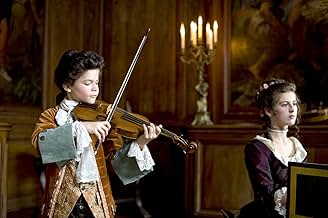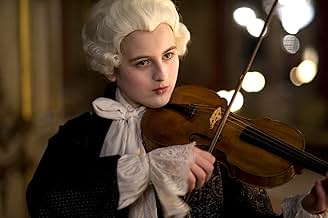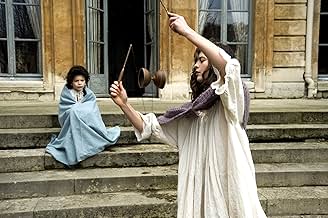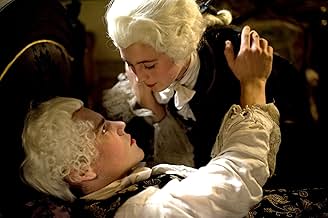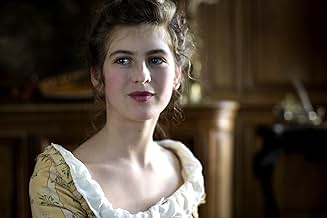Nannerl, la soeur de Mozart
NOTE IMDb
6,4/10
1,6 k
MA NOTE
Ajouter une intrigue dans votre langueA reimagined account of the early life of Maria Anna 'Nannerl' Mozart, five years older than Wolfgang, and a musical prodigy in her own right.A reimagined account of the early life of Maria Anna 'Nannerl' Mozart, five years older than Wolfgang, and a musical prodigy in her own right.A reimagined account of the early life of Maria Anna 'Nannerl' Mozart, five years older than Wolfgang, and a musical prodigy in her own right.
- Réalisation
- Scénario
- Casting principal
- Récompenses
- 2 victoires et 8 nominations au total
Avis à la une
Léopold Mozart promotes his musical children; Wolfgang and his elder 14 year old daughter Maria Anna 'Nannerl' Mozart (Marie Féret) to the royalties throughout Europe. He tries to restrict Nannerl's musical ambitions in the patriarchal society. She believes she may have contributed to Wolfgang's writing but Léopold dismisses her and forbids her from continuing to write. She befriends the daughters of the King especially Louise. She delivers a letter to Louise's brother Le Dauphin in mourning but she has to be disguised as a man to avoid a scandal. He encourages her to write. She meets him several times but only in disguised. He is conflicted about making her his mistress unwilling to repeat his father's debauchery.
This is an intriguing fictional biography. Marie Féret is the director's daughter and mostly fails to energize this costume period piece. The movie is two hours long and requires her to carry it on her shoulders. This has loads of potential for scandal and passion but none of it comes to pass. This does have a quiet beauty but is mostly a squandered opportunity.
This is an intriguing fictional biography. Marie Féret is the director's daughter and mostly fails to energize this costume period piece. The movie is two hours long and requires her to carry it on her shoulders. This has loads of potential for scandal and passion but none of it comes to pass. This does have a quiet beauty but is mostly a squandered opportunity.
I found this to be an enjoyable period drama about the Mozart family. Remember it is a French made film, made in French language. Top notch English subtitles are necessary on DVD. I doubt the movie, released in the autumn of 2011, would have got worldwide cinema attraction.
Most of us watching would not know the story of Wolfgang Mozarts sister and I have no special interest in classical music, though as a tourist, yes, I did once visit Salzburg.
The film centres around the maturity of the young Nanna and her exploitable musical potential while in friendship at least with the French Dauphin.
The movie contains too much talking overall and I usually like French movies for that but not this time. I liked the acting and the costume drama and I liked the story itself, though two hours is definitely too long and for a non French speaking audience, not many are going to stay until the end. I nodded off the first time after 30 minutes and gave the film a late afternoon re-viewing earlier this afternoon.
Nothing offensive or conspiratorial about the movie. It simply dramatise a story from a book published a few years ago. Enjoy the movie for what it is and do not expect too much.
The music does come across as a little false and overdone but 6 from 10 is about right pitch for its rating.
Most of us watching would not know the story of Wolfgang Mozarts sister and I have no special interest in classical music, though as a tourist, yes, I did once visit Salzburg.
The film centres around the maturity of the young Nanna and her exploitable musical potential while in friendship at least with the French Dauphin.
The movie contains too much talking overall and I usually like French movies for that but not this time. I liked the acting and the costume drama and I liked the story itself, though two hours is definitely too long and for a non French speaking audience, not many are going to stay until the end. I nodded off the first time after 30 minutes and gave the film a late afternoon re-viewing earlier this afternoon.
Nothing offensive or conspiratorial about the movie. It simply dramatise a story from a book published a few years ago. Enjoy the movie for what it is and do not expect too much.
The music does come across as a little false and overdone but 6 from 10 is about right pitch for its rating.
I didn't know what to expect with the movie Mozart's Sister, but I was surprised - it was very good - even watching it with subtitles.
The movie gives a very believable and intimate picture of father Leopold Mozart's young family - with prodigies Wolfgang at age 11 and older sister Anna Maria (Nannerl) at 14 - and mainly involves their travels seeking musical glory. It has all the stuff you'd expect in a 1760's family including musical practice, family fun and playful laughter, adventures, and also Wolfgang and Nannerl's wish to compose. Good script, well paced and interesting plot, and a focus on Nannerl make this a winner. I might watch it again!
My Rank: 8 / 10.
The movie gives a very believable and intimate picture of father Leopold Mozart's young family - with prodigies Wolfgang at age 11 and older sister Anna Maria (Nannerl) at 14 - and mainly involves their travels seeking musical glory. It has all the stuff you'd expect in a 1760's family including musical practice, family fun and playful laughter, adventures, and also Wolfgang and Nannerl's wish to compose. Good script, well paced and interesting plot, and a focus on Nannerl make this a winner. I might watch it again!
My Rank: 8 / 10.
It's difficult for me to see a film like this as a professional musician without seeing red at the same time. No, I'm not expecting a slavish rehash of history - far from it -but it wandered so far from reality as to remind me of films such as "Song to Remember" with Cornel Wilde swinging through the grapevines and playing the frail, tubercular Chopin at the same time.
Leopold Mozart, despite the general feeling that he pushed his children unmercifully, was actually trying to help his children become established in the world and to prevent his son from squandering his money as he was always tempted to do. In fact poor Wolfgang was buried in a pauper's grave after his father died.
The music in the film is another bone of contention. Instead of using something from the immense amount of music Wolfgang composed as background, it substituted a fake Classical imitation with romantic harmonies and orchestration that really wasn't good to begin with.
As for the ultra-low lighting we associate with "le film noir' or crime shows currently on television, we had to depend too often on dialog alone to guide us through what was happening. I realize that filming interiors with candles was period but even people sitting next to them were mainly in the dark. I know this is handy for not having to provide full period sets in detail but still I felt cheated.
This is a French work, nonetheless, and as so many French films are prone to do, it talks itself to death.
Curtis Stotlar
Leopold Mozart, despite the general feeling that he pushed his children unmercifully, was actually trying to help his children become established in the world and to prevent his son from squandering his money as he was always tempted to do. In fact poor Wolfgang was buried in a pauper's grave after his father died.
The music in the film is another bone of contention. Instead of using something from the immense amount of music Wolfgang composed as background, it substituted a fake Classical imitation with romantic harmonies and orchestration that really wasn't good to begin with.
As for the ultra-low lighting we associate with "le film noir' or crime shows currently on television, we had to depend too often on dialog alone to guide us through what was happening. I realize that filming interiors with candles was period but even people sitting next to them were mainly in the dark. I know this is handy for not having to provide full period sets in detail but still I felt cheated.
This is a French work, nonetheless, and as so many French films are prone to do, it talks itself to death.
Curtis Stotlar
It seems very tempting, Mozart's Sister – the opportunity of another 18th century costume picture, this one from France – produced, written and directed by René Féret. For those who enjoy historical fiction, the film poses as yet one more chance to unlock the doors and peer into the family closets of composer Wolfgang Amadeus Mozart. After all, it's been twenty-seven years since the spectacular emergence of director Milos Forman's Amadeus, which gathered eight Oscars, including Best Picture – as well as for the author of its screenplay, Peter Shaffer, adapting and shaping his multi-Tony Award-winning theatrical masterpiece into iconic cinematic genius. Since the 1984 premiere of Amadeus, business continues to boom in the Mozart industry; a chance at playing either of the Leading Roles of the so-called "rivals" – Mozart and (the nearly forgotten and second-rate) composer Antonio Salieri – continue to inflame the ambitions of many a stage actor; and a recent release of the film into Blu-Ray format proves that Amadeus is here to stay and guaranteed a re-incarnation into whatever format is on the horizon. Mozart's Sister is destined for landfill.
Amadeus and Mozart's Sister are both of the "re-imagined" variety. In other words, for its authors, Truth is but an adjunct to Creative License. Re-imagining the adventures of the Mozart family begins somewhere in a flurry of sheet music, ribbon-bound letters, yellowing diaries, and stories heard around any Music Conservatory. Somewhere in this reverie, René Féret and Peter Shaffer both employ the same controlling gimmick — "I coulda been somebody!" For Shaffer, Salieri knows his musical gifts are lacking, but the Viennese Court doesn't know it until Mozart suddenly shows up. According to Féret, Mozart's sister Nannerl believes that – had she been born as Wolfgang's brother – they might have become the first European Dynamic Duo. No need for Certitude here. "Re-imagined" needs just a few facts and figures, but the finished product requires the entertainment value of Barnum & Bailey. Mozart's Sister wouldn't qualify for a side show.
René Féret's shooting script of Mozart's Sister cannot avoid comparison to Amadeus. Peter Shaffer nurtured his idea through the disciplines of live Theatre. The structure and rhythm of his re-imagined Amadeus is developed through much rehearsal and three continuous years on Broadway before he re-vamps the script for Hollywood. By contrast, Féret's end product is a plodding, witless and gloomy bore. His treatment of the premise that Nannerl Mozart is a suppressed and thwarted genius composer with Box Office appeal similar to that of her brother's – is limp and void of artistic climax. Likewise, there's no satisfaction to be had in the tedious and anemic performances rendered by Féret's daughters – Marie as "Nannerl" and Lisa as "Louise of France".
Salieri, on the other hand, would applaud Mozart's Sister for its inherent mediocrity.
Amadeus and Mozart's Sister are both of the "re-imagined" variety. In other words, for its authors, Truth is but an adjunct to Creative License. Re-imagining the adventures of the Mozart family begins somewhere in a flurry of sheet music, ribbon-bound letters, yellowing diaries, and stories heard around any Music Conservatory. Somewhere in this reverie, René Féret and Peter Shaffer both employ the same controlling gimmick — "I coulda been somebody!" For Shaffer, Salieri knows his musical gifts are lacking, but the Viennese Court doesn't know it until Mozart suddenly shows up. According to Féret, Mozart's sister Nannerl believes that – had she been born as Wolfgang's brother – they might have become the first European Dynamic Duo. No need for Certitude here. "Re-imagined" needs just a few facts and figures, but the finished product requires the entertainment value of Barnum & Bailey. Mozart's Sister wouldn't qualify for a side show.
René Féret's shooting script of Mozart's Sister cannot avoid comparison to Amadeus. Peter Shaffer nurtured his idea through the disciplines of live Theatre. The structure and rhythm of his re-imagined Amadeus is developed through much rehearsal and three continuous years on Broadway before he re-vamps the script for Hollywood. By contrast, Féret's end product is a plodding, witless and gloomy bore. His treatment of the premise that Nannerl Mozart is a suppressed and thwarted genius composer with Box Office appeal similar to that of her brother's – is limp and void of artistic climax. Likewise, there's no satisfaction to be had in the tedious and anemic performances rendered by Féret's daughters – Marie as "Nannerl" and Lisa as "Louise of France".
Salieri, on the other hand, would applaud Mozart's Sister for its inherent mediocrity.
Le saviez-vous
- GaffesNear the opening of the film, Nannerl tells Louise that she is 14, almost fifteen. This place the action in the winter of 1765-66. While the character Louise says she is 13, the real Louise would have been 28 years old. In fact, the princess return to court from the Abbey of Fontevraud in 1750, the year before Nannerl's birth.
Meilleurs choix
Connectez-vous pour évaluer et suivre la liste de favoris afin de recevoir des recommandations personnalisées
- How long is Mozart's Sister?Alimenté par Alexa
Détails
- Date de sortie
- Pays d’origine
- Sites officiels
- Langue
- Aussi connu sous le nom de
- Mozart's Sister
- Lieux de tournage
- Sociétés de production
- Voir plus de crédits d'entreprise sur IMDbPro
Box-office
- Budget
- 4 500 000 $US (estimé)
- Montant brut aux États-Unis et au Canada
- 707 885 $US
- Week-end de sortie aux États-Unis et au Canada
- 34 046 $US
- 21 août 2011
- Montant brut mondial
- 1 380 379 $US
Contribuer à cette page
Suggérer une modification ou ajouter du contenu manquant


